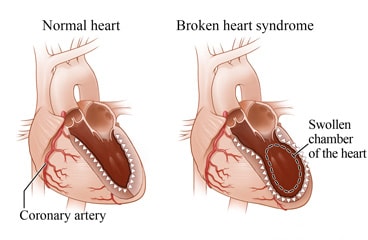Overview

With broken heart syndrome, the heart has trouble pumping blood normally. A chamber of the heart swells up like a small balloon. Broken heart syndrome is also called takotsubo (say "TACK-uh-zoo-boh") syndrome or stress cardiomyopathy (say "kar-dee-oh-my-AWP-uh-thee").
Broken heart syndrome is often triggered by great emotional stress, such as grief after losing a loved one. It can also be triggered by physical stress, such as having a serious health problem. Sometimes the cause is not known.
Broken heart syndrome causes the same symptoms as a heart attack, but it's not a heart attack. Some of the most common symptoms are:
- Sudden chest pain.
- Shortness of breath.
- Fainting.
Other symptoms may include a pounding or fast heartbeat or nausea.
A heart attack is caused by a blockage in one or more of the coronary arteries. These arteries supply the heart muscle with blood. But broken heart syndrome isn't caused by blocked coronary arteries.
You will likely take medicines for a short time to help your heart muscle recover. These may include medicines that make it easier for your heart to pump blood. Some people may need to take medicines long-term.
In most people, the heart starts pumping normally again within a few days or weeks. For some people, it can take several months to return to normal.
Follow-up care is a key part of your treatment and safety. Be sure to make and go to all appointments, and call your doctor if you are having problems. It's also a good idea to know your test results and keep a list of the medicines you take.
How can you care for yourself at home?
- Be safe with medicines. Take your medicines exactly as prescribed. Call your doctor if you think you are having a problem with your medicine.
- If you take a blood thinner, be sure to get instructions about how to take your medicine safely. Blood thinners can cause serious bleeding problems.
- Lead a heart-healthy lifestyle. Here are some tips:
- If your doctor recommends it, get more exercise. Walking is a good option for many. Bit by bit, increase the time you're active every day. Try for at least 30 minutes on most days of the week.
- If you smoke, vape, or use other tobacco or nicotine products, try to quit. If you can’t quit, cut back as much as you can. If you need help quitting, talk to your doctor about quit programs and medicines. These can increase your chances of quitting for good.
- Eat a healthy diet that is low in saturated fat and salt and is full of fruits, vegetables, and whole grains.
- Stay at a weight that's healthy for you. Talk to your doctor if you need help with this.
Call 911 anytime you think you may need emergency care. For example, call if:
- You have symptoms of a heart attack. These may include:
- Chest pain or pressure, or a strange feeling in the chest.
- Sweating.
- Shortness of breath.
- Nausea or vomiting.
- Pain, pressure, or a strange feeling in the back, neck, jaw, or upper belly or in one or both shoulders or arms.
- Lightheadedness or sudden weakness.
- A fast or irregular heartbeat.
- After you call 911, the operator may tell you to chew 1 adult-strength or 2 to 4 low-dose aspirin. Wait for an ambulance. Do not try to drive yourself.
Call your doctor now or seek immediate medical care if:
- You have new or worse symptoms, such as:
- New or increased shortness of breath.
- New or worse swelling in your legs, ankles, or feet.
- Sudden weight gain, such as more than 2 to 3 pounds in a day or 5 pounds in a week. (Your doctor may suggest a different range of weight gain.)
- Feeling dizzy or lightheaded or like you may faint.
- Feeling so tired or weak that you cannot do your usual activities.
- Not sleeping well. Shortness of breath wakes you at night. You need extra pillows to prop yourself up to breathe easier.
Watch closely for changes in your health, and be sure to contact your doctor if you have any problems.
Where can you learn more?
Go to http://www.healthwise.net/patientEd
Enter H855 in the search box to learn more about "Broken Heart Syndrome: Care Instructions".
Current as of: October 2, 2025
Author: Ignite Healthwise, LLC Staff
Clinical Review Board
All Ignite Healthwise, LLC education is reviewed by a team that includes physicians, nurses, advanced practitioners, registered dieticians, and other healthcare professionals.

